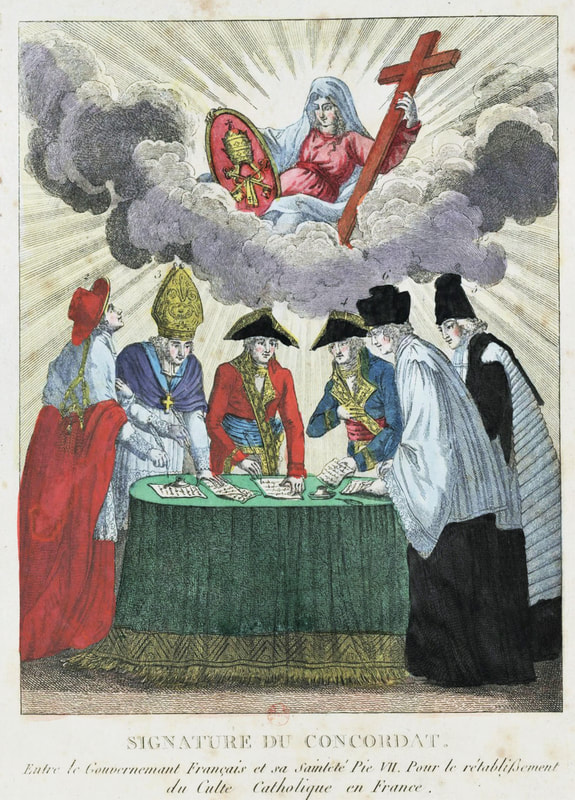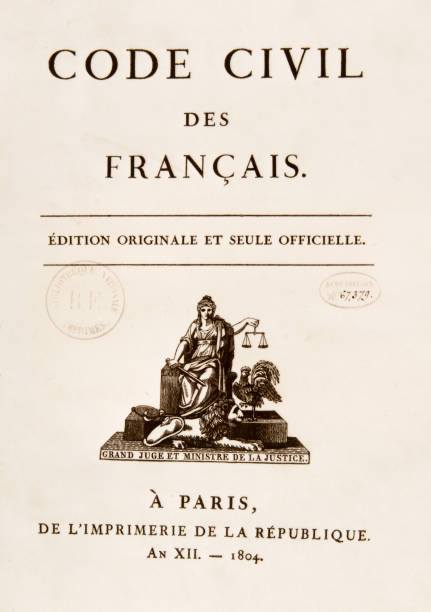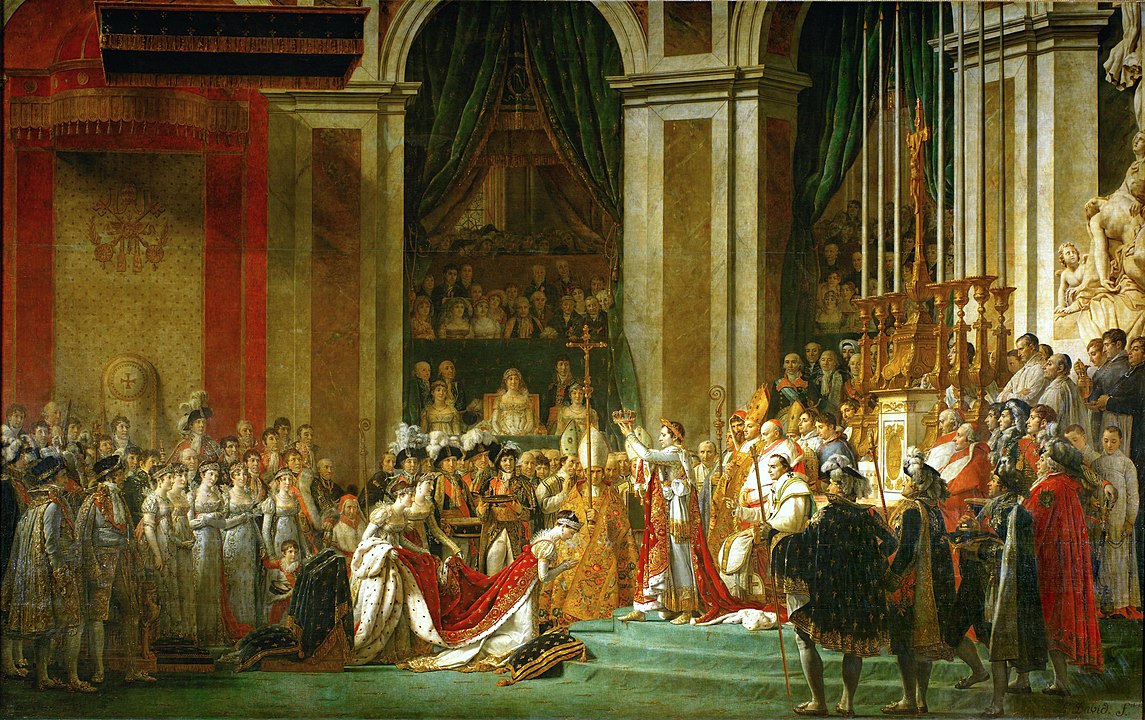Lesson 5 - Napoleon reforms France: change, continuity and reaction.
|
Now that he was in power, Napoleon set about reforming France. Some of what he did was a change from the revolutionary era, some was a continuation. Whilst there was no complete return to the pre-revolutionary era, there were some signs of reactionary policies which harked back to the ancien regime. And it must be remembered throughout that in reforming France his intention was always to strengthen his position.
The Concordat and the Catholic Church As we have seen, during the Terror, churches had been closed and France was 'de-christianised’. Millions of loyal Catholics hated this. |
|
|
Napoleon had to end this religious conflict if his new government was to last. He began by dropping the ten-day week of the Revolutionary Calendar and allowed people to take Sundays off. He told rebel leaders that he would deal with their religious complaints. Most important of all, in 1801 he signed an agreement with the Pope called the Concordat. In the Concordat, Napoleon agreed to allow Catholics to worship freely again. In return, the Pope allowed Napoleon to appoint all the bishops in France and agreed that all priests should take an oath of loyalty to Napoleon. As a result of the Concordat, priests were able to come out of hiding and churches re-opened. It gave Napoleon the support of millions of Catholics who had spent the last ten years hating the revolution.
Education
In 1802 he began a reform of the country’s schools. The education system was reorganised in France, giving more boys an opportunity to learn. The main change was the creation of a new kind of secondary school, the lycée which was not controlled by the Church. Living under strict military discipline, pupils at these high schools studied a curriculum drawn up by the government which aimed to produce skilled administrators and soldiers. On leaving, they took an examination called the Baccalaureate for entrance to university. All teachers were to be properly trained and paid for by the state. |
|
Law
Perhaps his greatest achievement was a reform of the French law into seven books called codes. He began in 1804 with a Code of Civil Law called the Code Napoléon. Codes of criminal and commercial law were added over the next five years. These codes simplified the very complex laws that had existed for centuries. They also made into law some of the things that revolutionaries had demanded in 1789. Individual rights, freedom of belief, and equality before the law were all included in the codes. When Napoleon established a European empire in the years that followed, the fundamental rights enshrined in the Code Napoléon would transform every country France controlled. Politics By 1802, Napoleon had made peace with Europe and ended the religious conflict at home. A grateful Senate increased his powers, raised his pay and made him 'Consul-for-Life’. Voters were asked to show what they thought of this. 3.5 million voted in favour, only 8,000 against. The government of France was organised under a new prefect system. A prefect was a government official. One prefect was appointed to each of the 83 departments (regions) of France to run the area and make sure that the government’s commands were obeyed. The National Convention, under the influence of abolitionist leaders like Maximilien Robespierre, abolished slavery in all French colonies in 1794. Under Napoleon Bonaparte, slavery was re-established in French colonies through the Law of 20 May 1802. Napoleon aimed to restore economic stability and control over the colonies. |
1804 - Emperor
In 1804 Napoleon increased his power still further by making himself Emperor. Again, voters showed their support with a massive vote of approval. France thus became an empire after twelve years of being a republic. As Emperor, Napoleon brought back some of the things that had been abolished during the Revolution. For example, he insisted on being crowned in a coronation ceremony like that of the old French kings. Next, Napoleon brought back noble titles for member's of his family. For example, his brothers Joseph and Louis became Grand Elector and Grand Constable of the Empire. Later, in 1808, he created an Imperial Nobility consisting of princes, dukes, counts, barons and knights. Nobles had to be very rich if they wanted to pass their titles on to their children: a prince, for example, had to leave his son an income of 200,000 francs a year to keep the title in the family. Unlike nobles before 1789, however, Napoleon’s nobles had no privileges.
In 1804 Napoleon increased his power still further by making himself Emperor. Again, voters showed their support with a massive vote of approval. France thus became an empire after twelve years of being a republic. As Emperor, Napoleon brought back some of the things that had been abolished during the Revolution. For example, he insisted on being crowned in a coronation ceremony like that of the old French kings. Next, Napoleon brought back noble titles for member's of his family. For example, his brothers Joseph and Louis became Grand Elector and Grand Constable of the Empire. Later, in 1808, he created an Imperial Nobility consisting of princes, dukes, counts, barons and knights. Nobles had to be very rich if they wanted to pass their titles on to their children: a prince, for example, had to leave his son an income of 200,000 francs a year to keep the title in the family. Unlike nobles before 1789, however, Napoleon’s nobles had no privileges.
Click on the painting of Jacques Louis David's painting of the coronation of Napoleon to examine the painting in close-up.
Activity
In pairs make a table like the one below. Watch the film 'change, continuity and reaction' and read the text. In the table explain how some of Napoleon’s actions marked a change from revolutionary France, how some were a continuity and others a reaction against the revolution and a return to pre-revolutionary practices.
In pairs make a table like the one below. Watch the film 'change, continuity and reaction' and read the text. In the table explain how some of Napoleon’s actions marked a change from revolutionary France, how some were a continuity and others a reaction against the revolution and a return to pre-revolutionary practices.




